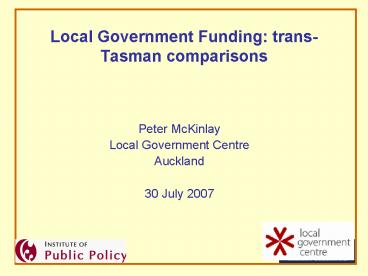Local Government Funding: transTasman comparisons - PowerPoint PPT Presentation
1 / 14
Title:
Local Government Funding: transTasman comparisons
Description:
... a New Zealand perspective, Australian local government's obsession with ... Contrast with Australian emphasis on targeted and general purpose grants (and ... – PowerPoint PPT presentation
Number of Views:36
Avg rating:3.0/5.0
Title: Local Government Funding: transTasman comparisons
1
Local Government Funding trans-Tasman comparisons
- Peter McKinlay
- Local Government Centre
- Auckland
- 30 July 2007
2
Scene Setting
- Similar but different jurisdictions the
influence of federal versus unitary systems (and
from a New Zealand perspective, Australian local
governments obsession with its inferior status). - Rating/funding inquiries everyones must have.
Government led as in Ireland, Scotland, England,
New Zealand and Australias Productivity
Commission. - Local government led as in New South Wales, South
Australia, and the Australian Local Government
Association.
3
Political Risk
- Everyone agrees that change is needed. No one
changes. - Lyons Inquiry dismissed within 24 hours of
delivery despite close working relationship
between Sir Michael Lyons and Gordon Brown/Ed
Balls. Scottish and Irish enquiries have been
sidelined. - The classic political dilemma. Winners will see
changes as proving they have been hard done by.
Losers will see their loss. No one will thank
the politicians.
4
The Basic Question to Resolve
- Are we dealing with local administration or local
government? - Local administration the delivery of a range of
basically housekeeping services to facilitate the
functioning of the local community. - Local government determining the future
economic, social, cultural and environmental
direction of the community and leading the
initiatives to achieve those.
5
The Funding - Autonomy Link
- Very common for higher tiers of government to
restrict local government funding, e.g.New South
Wales ratecapping, UK budgetary control. - New Zealand one of very few where local
government has freedom to set its own revenue and
borrowing levels (there are some constraints on
charging in areas such as liquor licensing). - Question can local government be genuinely
autonomous and accountable primarily to its
communities if it does not have funding autonomy?
6
Evolution of the New Zealand System
- Differentials introduced in the 1970s.
- Uniform annual general charge in 1982.
- Removal of borrowing constraints mid-1990s
(abolition of Local Authorities Loans Board). - Introduction of targeted rates in 2002.
- A general theme of funding autonomy but
increasingly demanding prospective and
retrospective accountability requirements.
7
Role of Government
- Limited central government funding and largely
ring fenced roading some water and sewerage
subsidy the main elements. - Generally a hands off approach. Governments
role is to set the framework rather than
determine the outcomes. - Contrast with Australian emphasis on targeted and
general purpose grants (and note that rates in
most Australian jurisdictions are significantly
lower than their New Zealand equivalents).
8
Flexibility
- The New Zealand system is highly flexible. South
Australia is the only local government system
which comes close. - Profound implications for the role of Council.
- Under a rigid system and the only question is how
much what is the rate in the dollar or the
level of the Council tax. - Under our flexible system the question becomes
who pays, how, for what, and why?
9
The Role of Funding
- Just to pay the bills?
- To provide incentives which encourage desired
behaviour? - To serve as the basis for local
government/community partnerships?
10
Just to Pay the Bills?
- Remains important and highly contentious.
- But is funding as just to pay the bills now a
necessary but not sufficient role? - Should we now consciously adopt a dual objective
approach any funding instrument for local
government should be designed both to raise
revenue and to incentivise outcomes that are in
the communitys interest?
11
Some Dual Objective Possibilities
- Environmental taxes a New Zealand equivalent of
the Irish plastic bag levy? - Full environmental cost pricing for water and
wastewater services (and should we see the
current debate over water charging in Auckland as
evidence of the death of good public discourse?). - Road pricing.
- Etc
12
Intergenerational Equity
- New Zealand local authorities are generally under
borrowed. - Rates are used to fund both capital expenditure
and operating expenditure and yet we want them
linked to the rate of inflation. - Why do todays ratepayers demand that councils
charge them both for this years share of capital
expenditure and for the share of future
generations? - Exacerbated by the impact of depreciation under a
balanced-budget regime.
13
The Growing Conflict Between Rising Expectations
and Willingness to Pay
- The dilemma facing virtually every New Zealand
and most Australian councils at one and the
same time ratepayers criticise the excessive
level of rates and charges, and demand more and
better services. - The special case of the older ratepayer the
so-called asset rich, income poor retiree. - Is this simply a need for improved financial
planning, efficiency and communication, or is it
evidence of a fundamental disconnect between
councils and the communities they serve?
14
Rates as the Basis for Local Government/
Community Partnerships
- Partnering with the commercial sector targeted
rates and Main Street programmes targeted rates
and enhanced security. - Partnering with residential ratepayers. The
emerging possibility of a local government/Energy
Efficiency and Conservation Authority
joint-venture to provide a range of energy
efficiency and related services for older
ratepayers funded through a combination of
government subsidy, targeted rates and rates
postponement (as an alternative to the ratepayer
paying themselves). - Possible extension to other services to support
ageing in place. - Are we witnessing the emergence of local
authorities as enablers of community-based
cooperatives for a range of innovative
activities?































